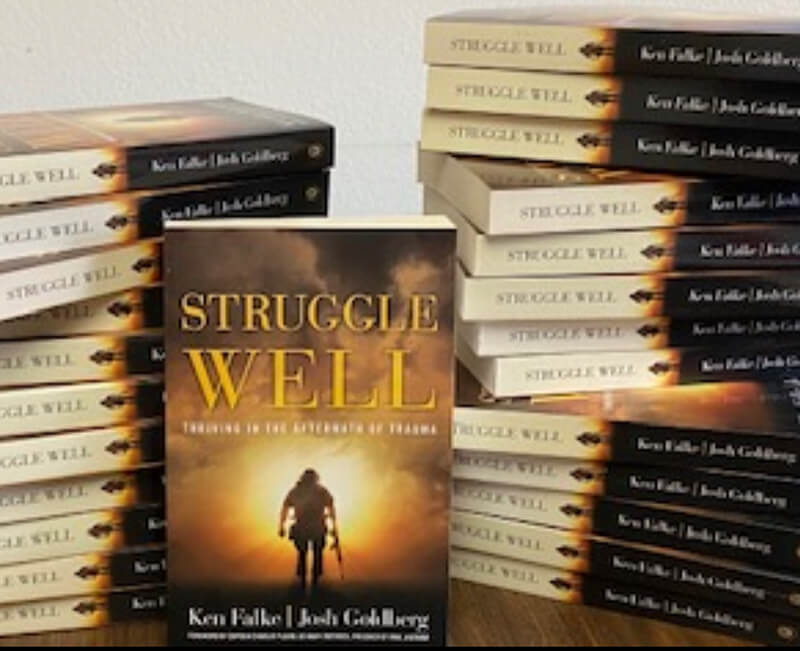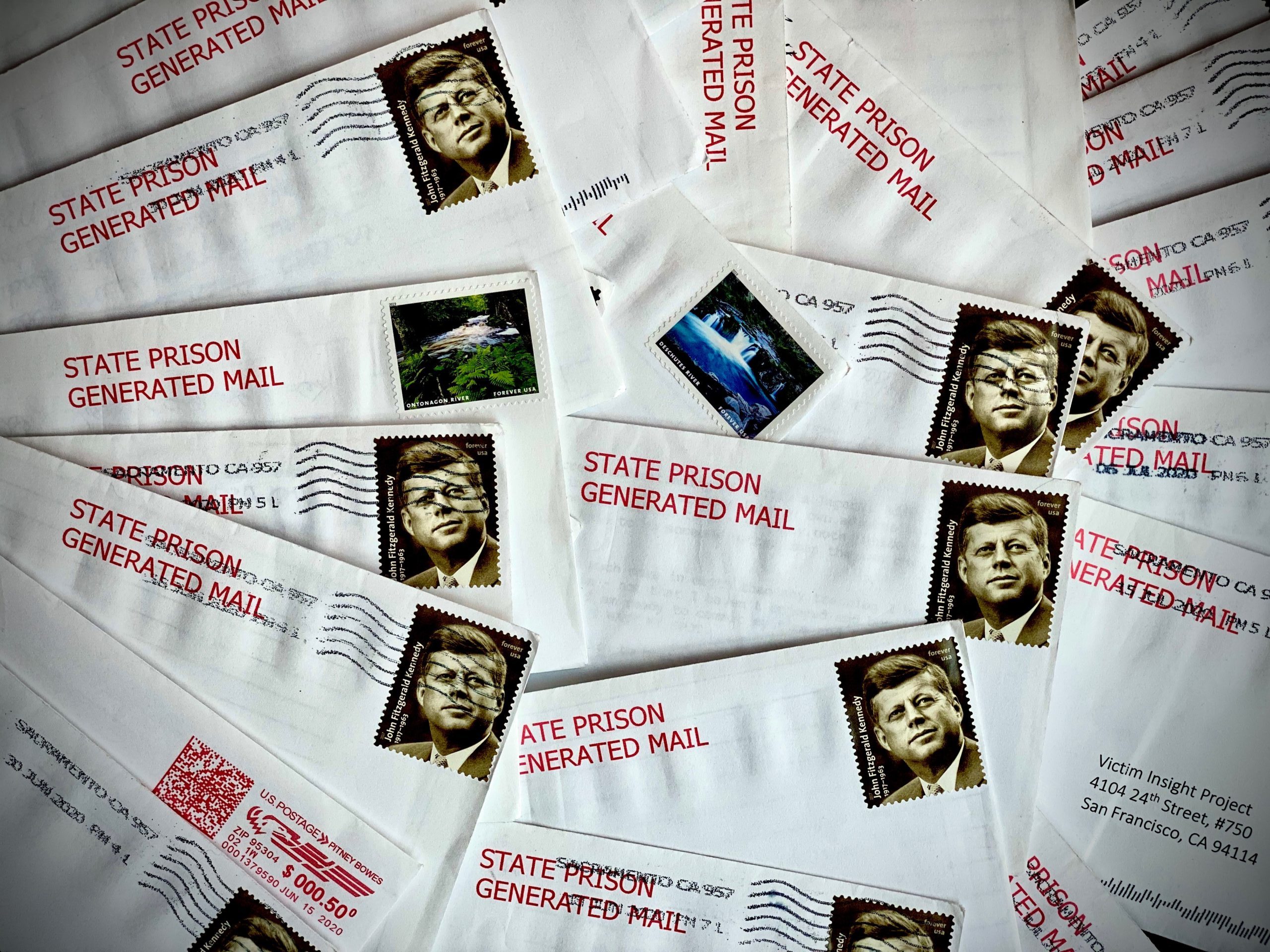What We Do
The Victim Insight Project is a nonprofit that facilitates peer support groups for those serving extended sentences in prisons in Northern California for violent crimes. Our groups are designed to promote community safety and repair by encouraging participants to explore the legacy of their own trauma and hold themselves accountable for their harms as key steps towards healing. Our supportive group culture builds a sense of community and resilience among our participants and guides them towards reclaiming a healthier sense of identity. In that way, we help to empower each group member to reconnect with their own humanity and the humanity of their victims so they can shed their shame and choose a positive path forward in their lives. All of our programs are informed by the voices and needs of survivors of trauma and places human dignity at the forefront.
“A human being is a part of the whole, called by us 'Universe,' a part limited in time and space. He experiences himself, his thoughts and feelings as something separated from the rest — a kind of optical illusion of his consciousness. This delusion is a kind of prison for us, restricting us to our personal desires and to affection for a few persons nearest to us. Our task must be to free ourselves from this prison by widening our circle of compassion to embrace all living creatures and the whole of nature in its beauty.”
– Albert Einstein
Our Values
Mass incarceration in the United States has incapacitated and alienated hundreds of thousands of people, perpetuating immeasurable and disproportionate trauma against people of color and others oppressed by economic and social inequities. To heal these systemic harms, we need to value and embrace each person’s humanity and be willing to engage and bear witness to their struggle and pain. And we need to take action.
The Victim Insight Project aligns itself with the transformative power of education, understanding, and community engagement as the optimal way to heal harm. The Victim Insight Project provides facilitated peer support groups that allow every trauma survivor to speak, be listened to, and be heard with respect and dignity. In this supportive environment, people who committed violence can develop their capacity for empathy through insight into their own victimization. This work can then allow them to rediscover their humanity and their potential for contribution and repair. Our support and inclusion of their voices into the larger dialogue is a vital step towards our individual and collective healing and freedom.
Who We Are
Justine Juson – Founder and Executive Director
Justine established The Victim Insight Project as a result of her work facilitating peer support groups at Deuel Vocational Institution, a level 3 prison in Tracy, California. Justine's professional background includes working as an employment law litigator for more than a decade before focusing on providing legal services to dependent minors and parents on San Francisco Superior Court's juvenile dependency panel. Justine began working inside prisons in 2017 when she volunteered to help launch and co-facilitate Insight Prison Project's first Victim Offender Education Group at Deuel Vocational Institution in Tracy, CA. Once she helped graduate that first VOEG cohort, she and her then co-facilitator, Karen Nance, established The Victim Insight Project and it's CLEAR program as a way to continue offering peer support, education, and inspiration to the men inside.
As a long-time resident of San Francisco, Justine has worked for numerous community organizations including facilitation of grief groups for children through Josie’s Place and serving as a crisis hotline volunteer at San Francisco Suicide Prevention. In addition to holding a Juris Doctorate, Justine has a Bachelor of Arts in English from the University of York, England, and a Masters in Fine Arts in Writing from the University of San Francisco. She has been trained in Batterer Intervention facilitation, African-American Multigenerational Trauma, Victim Offender Education Group work and Victim Offender Dialogues. She is currently focused on earning a masters degree in Counseling and Psychology with an emphasis in Correctional Psychology through Santa Clara University. In her spare time, she enjoys hiking with her husband and two children, writing short stories, reading, and swimming competitively on behalf of USF’s Masters Swim Team and in the open waters of the Bay.
Nina Bhutani — Board Member/ Advisory Circle
Nina Bhutani has devoted her professional career to social justice, serving more than 1000 marginalized and disadvantaged children, youth and parents throughout the Bay Area as a dependency lawyer. Nina began her career 24 years ago, representing children and parents on San Francisco Superior Court's juvenile dependency panel. Recognizing the complex web of problems affecting families, Nina championed and successfully fostered a holistic therapeutic approach to serving her clients' interests, developing honest and trusted relationships with judges, treatment providers and child welfare specialists to ensure both systems and parents were held accountable for compliance and outcomes. Her law firm, Goodman & Bhutani, earned a bay area-wide reputation among colleagues, service providers, and judges on the bench for their professionalism, integrity, and legal excellence.
After 14 years, Nina transitioned to a solo practice on Contra Costa County Superior Court's dependency panel. She practices dependency law in that jurisdiction to this day, representing more than 90 children and their families. Throughout her career, Nina has been committed to fairness and racial equity, remaining a strong and steady advocate for increasing critical consciousness around issues of implicit racial bias, disproportionality and disparate impact in the child welfare system.
Nina was born in India and spent her childhood living in Iran, New Jersey, Taiwan and Hong Kong. She has a Bachelors of Arts in Political Science and a Juris Doctor from the University of San Francisco. In her spare time, she loves watching sports, reading, doing puzzles and hanging out with her 60 pound pit bull.
Julie Sykes — Board Member/ Advisory Circle
Julie has worked as a technical writer for various Bay Area corporate and governmental agencies for more than 22 years. She currently writes for Sonoma Water, an agency whose mission is to effectively manage the water resources in its care for the benefit of people and the environment through resource and environmental stewardship. Throughout her career, Julie has engaged in advocacy and activism for many nonprofit and civic organizations, including Planned Parenthood, the Women’s Action Coalition, Pets are Wonderful Support and the Committee on the Shelterless. She has also volunteered with the Marin Humane Society and the Golden Gate Raptor Observatory. Julie holds a Bachelor of Arts in English Literature from San Francisco State University and a Master of Arts in Life Transitions Counseling Psychology from the University of San Francisco. Julie lives in Sonoma County where she enjoys bird watching, photography, hiking and spending time with friends and family.
Ahtossa Fullerton — Advisory Circle
Ahtossa is a Partner at Wasacz Hilley & Fullerton LLP where she practices juvenile dependency law. She is a certified Child Welfare Law Specialist and mediator. Ahtossa has volunteered for a number of non-profit, civic and educational organizations over the years, currently serving on the Boards of the Marin County Bar Association and Marin County Women Lawyers. Ahtossa also serves as a Judge Pro Tem in Marin County Superior Court, and regularly volunteers for Legal Aid of Marin. She is a graduate of the University of California, Davis and later received a Juris Doctorate and Masters in Business Administration from Santa Clara University. Before practicing juvenile dependency, she practiced corporate law for emerging technology companies in Silicon Valley. Ahtossa is a Bay Area native and lives in Marin with her husband, 3 kids and multiple pets.
Elizabeth Kita — Advisory Circle
Elizabeth (Beth) Kita is a clinical social worker in public/private practice in San Francisco, California. In her private practice, she works primarily with people contending with the effects of complex posttraumatic stress and vicarious traumatization; her work at the Behavioral Health Reintegration Program within DAPO is with people who are returning to the community following lengthy periods of incarceration. She obtained her MSW from UC Berkeley and her PhD from Smith College, School for Social Work. In addition to her clinical work, Beth teaches in the MSW program at UC Berkeley, and is the Co-Chair of the Coalition for Clinical Social Work at the San Francisco Center for Psychoanalysis. She thinks, writes, presents and consults on the intersections of race/racism, trauma, violence, incarceration and psychodynamic social work praxis in the United States.
Austin Willis — Volunteer Coordinator
For the past three years, Austin has sought equitable outcomes in his local community. As the Head of Outreach for the Santa Clara County Peer Court and a youth advocate for the Marin County Peer Court, Austin has supported his fellow Bay Area youth with the goal of diverting them from the traditional criminal justice system. In those roles, he has helped to craft restorative plans that expunge juvenile criminal records. Additionally, he is working to create a peer court program in San Mateo County.
Austin serves as a youth liaison to San Mateo County’s Juvenile Justice and Delinquency Prevention Commission, providing perspective on the traditional juvenile justice system. In addition, Austin chairs the Education and Economic Development Subcommittee of the San Mateo County Youth Commission, which is currently advocating for the adoption of ethnic studies curricula to improve equity in education. Austin has lived in the Bay Area for 17 years. He presently attends Crystal Springs Uplands High School. In his free time, Austin enjoys reading political commentary and playing tennis and basketball.
Our Programs
All of our programs are informed by the voices and needs of survivors of trauma and places human dignity at the forefront.
The CLEAR Program — Cultivating Learning Empathy and Repair
CLEAR is a two-year peer support program through which group members examine the lasting impacts of their crime and commit to understanding the pain they have caused others. The program encourages group members to unpack and process their traumatic experiences in the safety of a trusted peer group so that they can make peace with and free themselves from the shame and grip of their negative emotions. They will also learn to deepen their capacity for empathy and compassion for their crime survivors’ pain through participating in listening circles with surrogate survivors and exploring the parallels that exist in all human suffering. CLEAR centers around the practice of weekly journal writing as well as the crafting of larger personal narratives that will be shared with and workshopped by the group. The program is informed by the ideas set forth in Danielle Sered's book, Until We Reckon, Violence, Mass Incarceration and A Road to Repair, and Ken Falke and Josh Goldberg's book, Struggle Well, Thriving in the Aftermath of Trauma which group members will read and discuss. Group members will graduate with a detailed Accountability and Repair Plan, outlining concrete and specific goals for continued growth and self-actualization in the areas of mental wellness, physical health, and community service.
The WOW Workshop — Writing Our Worth
Our Writing Our Worth workshop is a six-month writing-based program that promotes the use of writing as a way to gain clarity over the past and to make meaning of it. The act of writing encourages deeper thinking and more mindful expression of thought. In our workshop, we encourage participants, through a series of weekly writing prompts, to draw connections between the past and present to gain insight and understanding of their own stories. Participants will gain a deep appreciation for how the act of constructing a story about a traumatic event helps to free themselves from its emotional grip. By the end of the program, participants will have developed a strong body of work upon which to reflect deeply upon and share with others. They will also have developed a clearer appreciation for themselves as creative, accountable witnesses to all that their lives have encompassed.
CLEAR Support
CLEAR Support is a correspondence-based course offering people who are incarcerated the opportunity to work through dynamics and issues related to their experience in prison and those that preceded their sentences. The program focuses on supporting the ongoing development of participants’ reflective capacities, ability to put their experiences into words, and identify personal goals and objectives that represent whole health, wellbeing, etc. Participants apply to the program and upon acceptance, receive materials on a monthly basis that cover a range of topics such as group dynamics, cultural competency, emotional intelligence, communication skills, empathy, and accountability. They are paired with a volunteer who reads, reflects upon and responds to their work via correspondence.
The CLEAR Support follows a structured curriculum of reading and writing assignments. It specifically supports individuals who prioritize their social and emotional learning but lack access to in-person peer support groups (due to the pandemic and other institutional barriers, such as geographic distance or lockdowns). The course guides participants through:
➢ setting concrete goals for individual health and community service
➢ holding themselves accountable for past actions
➢ evaluating their strengths and weaknesses
➢ healing from trauma
➢ developing compassionate inner resources to deal with challenges, both old and new
➢ improving interpersonal skills (communication, empathy, and trust)
We offer a six-month program to all of our group members followed by a one-year program for those wish to continue the work and have demonstrated the capacity and commitment to engage in deeper level self-guided work. Some of the additional course offerings for the longer program include: family influences, the legacy of loss, understanding and reframing shame, domestic violence, harm progression and experiences of survivors of crime. We also offer an Inside Facilitator's Training Program for those individuals who have completed both courses and would like to offer support and guidance to other newer CLEAR group members.
Testimonials
“I have great respect for this (CLEAR Correspondence) course, the assignments generate deep thinking so one can interact between the mind and the heart. The curriculum is more than basic. I could only imagine how a group session would go. Truly, this is for serious people only. Also I am appreciative of the genuine feedback, makes me feel heard and confirms I’m on the right course.” —Phillip
Become A Volunteer
The Victim Insight Project is delighted to partner with dedicated individuals who have a sincere interest in social justice and want to work with marginalized populations in prison settings. We are committed to increasing the diversity of our team and strongly encourage formerly incarcerated individuals and individuals of color to apply.
CLEAR FACILITATOR TRAINING
“One of the amazing things about working as a The Clear Project facilitator is that you are going to be doing something impactful for individuals living in carceral settings while developing skills and knowledge that will enrich your own life in ways that you can’t imagine. When I started training to facilitate peer support groups in prison, I believed I would be making a difference. I had no way of knowing that I was embarking on something that would touch their lives and my own in so many ways. I have always done volunteer work, but I have never been so richly rewarded as I have been facilitating groups for men serving life sentences in prison.”
CLEAR Trainings are designed to teach the skills needed to facilitate the CLEAR Program in prison settings. We ask those who are interested in taking the training to please commit to volunteering in a group for at least a year, with a weekly onsite time commitment of 3 hours every week. With the supervision of a staff member, volunteers work to create a safe environment for the group participants behind the walls to take full accountability for their crimes, explore their past histories of trauma, and develop skills and insights to make repair and different choices around their future paths.
The CLEAR Volunteer Facilitator Training is an intimate experience with opportunities to develop connections with other group participants and deeper self-awareness around your feelings and beliefs around harm, trauma and healing. We collect applications on an ongoing basis, so feel free to reach out at any time so we can send you the form and you can begin the process. Decisions will be made based on current needs and applicants’ availability and schedule flexibility. These trainings fill up quickly, so we encourage you to send your application in early!
Connect With Us
Contact Info
Address
4104 24th Street, #750
San Francisco, CA 94114
Email Us
Call Us
1 (415) 562-4148







